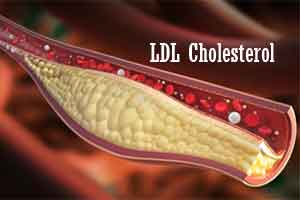- Home
- Editorial
- News
- Practice Guidelines
- Anesthesiology Guidelines
- Cancer Guidelines
- Cardiac Sciences Guidelines
- Critical Care Guidelines
- Dentistry Guidelines
- Dermatology Guidelines
- Diabetes and Endo Guidelines
- Diagnostics Guidelines
- ENT Guidelines
- Featured Practice Guidelines
- Gastroenterology Guidelines
- Geriatrics Guidelines
- Medicine Guidelines
- Nephrology Guidelines
- Neurosciences Guidelines
- Obs and Gynae Guidelines
- Ophthalmology Guidelines
- Orthopaedics Guidelines
- Paediatrics Guidelines
- Psychiatry Guidelines
- Pulmonology Guidelines
- Radiology Guidelines
- Surgery Guidelines
- Urology Guidelines
Lower LDL cholesterol leads to nerve damage in patients with type 2 diabetes: JAMA

Germany: LDL (low-density lipoprotein) cholesterol, termed as the bad cholesterol has a beneficial role in maintaining the nerve function and healing in patients with type 2 diabetes (T2D) and diabetic polyneuropathy (DPN), suggests a recent study.
The study, published in the journal JAMA found that lower serum cholesterol levels, particularly LDL cholesterol in patients with T2D and DPN is associated with higher nerve lesions and declining nerve conduction velocities and amplitudes.
In patients with type 2 diabetes, lowering the levels of serum cholesterol is a well-established treatment. However, an increase in nerve lesions is observed to be associated with lower serum cholesterol levels, suggesting the role of lowering serum cholesterol levels with DPN in T2D patients.
"These findings may be relevant to the new emerging treatments that aim to aggressively lower serum cholesterol levels in patients with type 2 diabetes," write the authors.
The researchers conducted a cross-sectional cohort study of 100 adults (mean age, 64.6 [0.9] years; 68 [68.0%] male) with type 2 diabetes and followed them from June 1, 2015, to March 31, 2018.
The primary outcome was the lesion load and extension. Secondary outcomes were clinical, serologic, and electrophysiologic findings.
Also Read: White meat raises LDL cholesterol as much as red meat, finds APPROACH clinical trial
Key findings:
- The lipid equivalent lesion (LEL) load correlated positively with the nerve’s mean cross-sectional area and the maximum length of a lesion.
- The LEL load was negatively associated with total serum cholesterol level (r = −0.41), high-density lipoprotein cholesterol level (r = −0.30), low-density lipoprotein cholesterol level (r = −0.33), nerve conduction velocities of the tibial (r = −0.33) and peroneal (r = −0.51) nerves, and nerve conduction amplitudes of the tibial (r = −0.31) and peroneal (r = −0.28) nerves.
Also Read: High LDL cholesterol increases risk for early-onset Alzheimer disease
"One principle finding of this study was that lipid metabolism may play an essential role in the development of peripheral nerve damage in patients with T2D and DPN." write the authors.
The push of modern medicine to use pharmaceuticals to lower LDL further in wider segments of the population may not always be the best choice. Studies like this help remind us that we need to consider the broader picture.
For detailed study follow the link: doi:10.1001/jamanetworkopen.2019.4798

Disclaimer: This site is primarily intended for healthcare professionals. Any content/information on this website does not replace the advice of medical and/or health professionals and should not be construed as medical/diagnostic advice/endorsement or prescription. Use of this site is subject to our terms of use, privacy policy, advertisement policy. © 2020 Minerva Medical Treatment Pvt Ltd